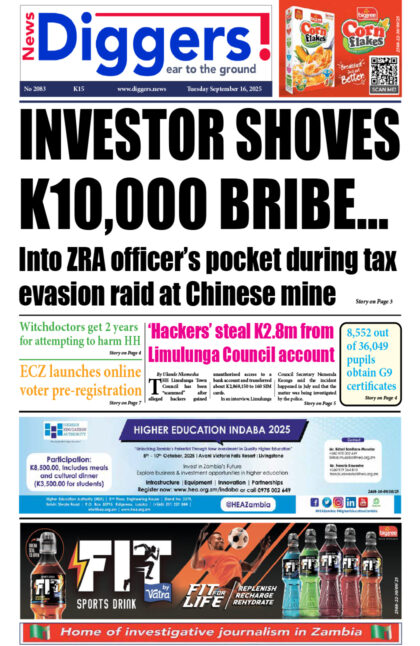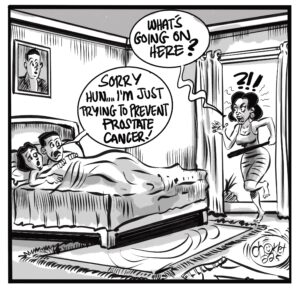UPND spokesperson Cornelius Mweetwa says it is difficult to sell the Presidential Jet because it’s an asset for the Zambia Air Force and not the President.
And ActionAid Zambia country director Nalucha Ziba says free education is unattainable at the moment due to the current debt situation.
Speaking on Diamond TV’s COSTA programme, Sunday, Mweetwa said despite UPND having its own manifesto, advice on policies was informed by the technocrats in government.
“You talking about selling the Presidential Jet, it is something that is neither here nor there because a Presidential jet is an asset for Zambia Air Force, it is not an asset for the President. On the issue of the jet, let us put full closure to this because this administration has been properly advised, when you run a government, you come with your manifestos, you come with your policies but your policies have to be informed by the technocrats. That is why you have a civil service, that is a going concern, where a political party comes in or goes out, they remain there to hold the statecraft together, and where necessary be able to give the accurate advice as to the state,” he said.
Mweetwa further explained that the current Ministers were driving second-hand cars that were left by the PF ministers.
“What cars are the Ministers now driving? I want to report to you and the nation that the vehicles we are driving are those that the Ministers under the PF were driving, that they left. In short, I can say we are driving second-hand vehicles because they are the ones that were left by the Ministers. For the UPND, we are looking at cost prudence. I think it is prudent that these vehicles, money has already been spent, it will be unwise to be able to go and buy other vehicles,” he said.
And Mweetwa said the idea of free education lies on the availability of resources.
“I want to state that the idea of free education does not lie in a time frame, it lies in the availability of resources being applied to ensure that the service is provided. As things stand now, we are just three weeks old in government, we are beginning to understand the whole fiscus of the nation. We are beginning to understand the extent of Zambia’s debt, we are beginning to understand the extent of erosion of resources through corruption, through plunder. Once this has been understood, you begin therefore to map out a framework within which to provide various services to the country. I want to state that it is a policy of the UPND which has endured 22, 23 years now. Even when the economy was performing very well under the MMD, that policy stood strong, that we are going to offer free education to those who cannot afford from grade one up to university. So, this policy announcement should not be tied to this particular election and the state of the economy,” said Mweetwa.
“Should Zambians say that those policies that the UPND and its leader, his Excellency President Hakainde Hichilema made such as free education should fall out of the window as rhetoric? No! it is not rhetoric and it is every intention of this government to be able to bring to fruition what they have promised. President Hichilema promised free education or universal education, he promised an end to political violence, it has ended, he promised an end to political cadrerism, it has ended, he promised an end to hostile takeovers like bus stops and markets, it has ended, he promised to bring corruption down, zero tolerance to corruption.”
Meanwhile, Ziba said free education was unattainable at the moment due to Zambia’s current debt situation.
“We don’t see free education being attainable now when we look at the current fiscus of the country. Largely I will just go with the debt figures of 2020, we were talking about $20 billion as Zambia’s debt. Of which 47 percent was to commercial lenders. If you look at the rate at which we have been servicing that debt, almost half of our national budget. What that means is that what remains from the national budget most of it goes towards salaries and recurring costs and expenditure. Therefore, there is very minimal that goes to social services. Even the little that we have been replacing when it comes to social services, it has been largely due to donor funding programmes. So, therefore, to say spending on social sectors had already collapsed. Therefore to say to bring free education in such scenarios brings about a lot of question marks in terms of where will be the financing and resourcing come from?” she asked.
Ziba said it was unfortunate that President Hakainde Hichilema’s address to the nation did not really give the true picture of Zambia’s debt.
“As much as the speech gave a broader view, it touched on so many areas, it is possible to achieve what the President did outline, but what I noticed was that what was outlined as being a five-year plan as opposed to being a plan for this year or getting into next year. It is feasible to attain it if there is discipline and also there is implementation, and in some areas, there is need for a bit of review of policies,” said Ziba.
“The way forward is not really clear on a number of issues, not just mining, even the issue of debt. As players in the sector, we were hoping to get a true picture in terms of where we are with our debt as opposed to the conflicts we have been getting. The country was desirous to know the way forward especially with the issues to do with KCM, and also the mining licences that were issued in protected areas like game parks and so on. But that policy direction did not really come forthright from him, he was probably trading cautiously.”
























